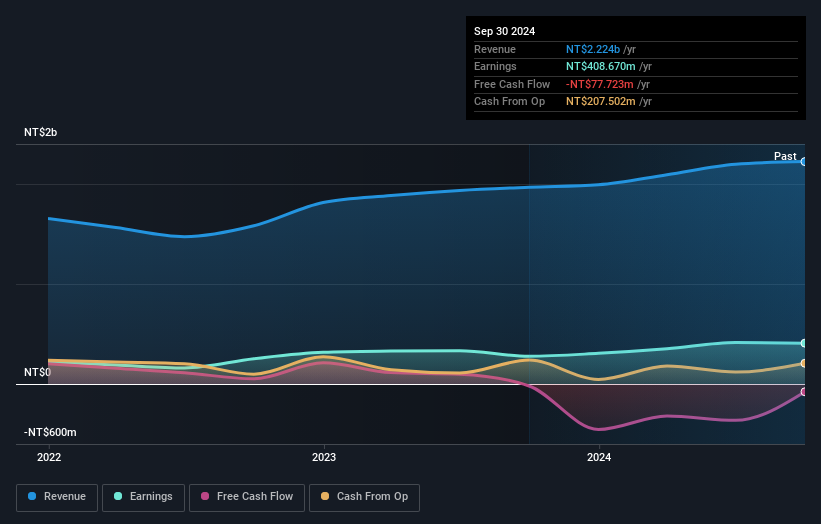- Taiwan
- /
- Semiconductors
- /
- TWSE:6937
Skytech Inc.'s (TWSE:6937) largest shareholders are retail investors who were rewarded as market cap surged NT$5.0b last week

Key Insights
- Significant control over Skytech by retail investors implies that the general public has more power to influence management and governance-related decisions
- A total of 10 investors have a majority stake in the company with 51% ownership
- 18% of Skytech is held by insiders
To get a sense of who is truly in control of Skytech Inc. (TWSE:6937), it is important to understand the ownership structure of the business. We can see that retail investors own the lion's share in the company with 44% ownership. In other words, the group stands to gain the most (or lose the most) from their investment into the company.
Clearly, retail investors benefitted the most after the company's market cap rose by NT$5.0b last week.
Let's delve deeper into each type of owner of Skytech, beginning with the chart below.
Check out our latest analysis for Skytech

What Does The Lack Of Institutional Ownership Tell Us About Skytech?
Institutional investors often avoid companies that are too small, too illiquid or too risky for their tastes. But it's unusual to see larger companies without any institutional investors.
There are multiple explanations for why institutions don't own a stock. The most common is that the company is too small relative to funds under management, so the institution does not bother to look closely at the company. On the other hand, it's always possible that professional investors are avoiding a company because they don't think it's the best place for their money. Institutional investors may not find the historic growth of the business impressive, or there might be other factors at play. You can see the past revenue performance of Skytech, for yourself, below.

Skytech is not owned by hedge funds. Zhaofu International Investment Co., Ltd. is currently the largest shareholder, with 6.9% of shares outstanding. For context, the second largest shareholder holds about 6.3% of the shares outstanding, followed by an ownership of 5.9% by the third-largest shareholder. Furthermore, CEO George Yi is the owner of 2.1% of the company's shares.
We did some more digging and found that 10 of the top shareholders account for roughly 51% of the register, implying that along with larger shareholders, there are a few smaller shareholders, thereby balancing out each others interests somewhat.
While it makes sense to study institutional ownership data for a company, it also makes sense to study analyst sentiments to know which way the wind is blowing. As far as we can tell there isn't analyst coverage of the company, so it is probably flying under the radar.
Insider Ownership Of Skytech
While the precise definition of an insider can be subjective, almost everyone considers board members to be insiders. The company management answer to the board and the latter should represent the interests of shareholders. Notably, sometimes top-level managers are on the board themselves.
I generally consider insider ownership to be a good thing. However, on some occasions it makes it more difficult for other shareholders to hold the board accountable for decisions.
It seems insiders own a significant proportion of Skytech Inc.. It has a market capitalization of just NT$25b, and insiders have NT$4.6b worth of shares in their own names. We would say this shows alignment with shareholders, but it is worth noting that the company is still quite small; some insiders may have founded the business. You can click here to see if those insiders have been buying or selling.
General Public Ownership
The general public, who are usually individual investors, hold a 44% stake in Skytech. This size of ownership, while considerable, may not be enough to change company policy if the decision is not in sync with other large shareholders.
Private Company Ownership
Our data indicates that Private Companies hold 38%, of the company's shares. It's hard to draw any conclusions from this fact alone, so its worth looking into who owns those private companies. Sometimes insiders or other related parties have an interest in shares in a public company through a separate private company.
Next Steps:
It's always worth thinking about the different groups who own shares in a company. But to understand Skytech better, we need to consider many other factors. Case in point: We've spotted 3 warning signs for Skytech you should be aware of, and 2 of them are a bit concerning.
Of course this may not be the best stock to buy. So take a peek at this free free list of interesting companies.
NB: Figures in this article are calculated using data from the last twelve months, which refer to the 12-month period ending on the last date of the month the financial statement is dated. This may not be consistent with full year annual report figures.
New: Manage All Your Stock Portfolios in One Place
We've created the ultimate portfolio companion for stock investors, and it's free.
• Connect an unlimited number of Portfolios and see your total in one currency
• Be alerted to new Warning Signs or Risks via email or mobile
• Track the Fair Value of your stocks
Have feedback on this article? Concerned about the content? Get in touch with us directly. Alternatively, email editorial-team (at) simplywallst.com.
This article by Simply Wall St is general in nature. We provide commentary based on historical data and analyst forecasts only using an unbiased methodology and our articles are not intended to be financial advice. It does not constitute a recommendation to buy or sell any stock, and does not take account of your objectives, or your financial situation. We aim to bring you long-term focused analysis driven by fundamental data. Note that our analysis may not factor in the latest price-sensitive company announcements or qualitative material. Simply Wall St has no position in any stocks mentioned.
About TWSE:6937
Excellent balance sheet with proven track record.
Market Insights
Community Narratives




